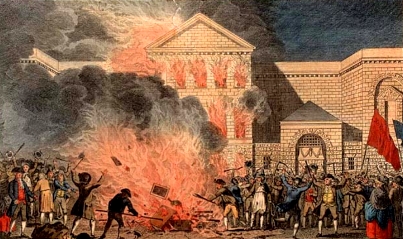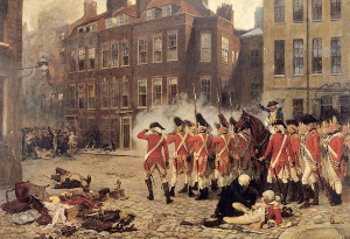John Newton to Thomas Robinson
My Dear Friend
You certainly do not quite deserve a line, but I will get one ready because I love you. I have seen several people from Leicester of late; they all tell me Mr Robinson is well, but none of them brings me a letter from him.
However, I believe you have thought of us now and then of late; and you will be glad to hear that the Lord supported and preserved us during the late commotions,[1] and that we are at present safe and well. Indeed it has been a time of trial, I believe they who had most faith were best off; for myself I have reason to be thankful that I had some, though I wished for more. I seemed to be not greatly afraid for myself, but I was anxious for my dear, for Sally and Peggy, and our child just coming up from Northampton. Now I think faith, when it is hearty and stout, will enable us to commit and entrust our all to the Lord, as well as our persons. Mine is not what it should be; but I would be thankful if I have any, though but as a grain of mustard seed.
The papers which you read render it unnecessary for me to be particular. The scene has been dreadful, yet trivial in comparison of what was designed. If the Lord had not interposed seasonably, if help had been delayed a few hours longer, I doubt not but London had been in ashes from end to end. The sudden rise of the mischief, its rapid progress, and the immediate effectual stop put to it when in the height of its rage, were all extraordinary. The stop seemed like putting an extinguisher over a candle—almost instantaneous.
The populace were twice in our square, and threatened to come again, but were not permitted. We had two or three obnoxious houses near us; but indeed things were come to that pass, that all houses were equally obnoxious, and they seemed bent upon pillage and devastation without distinction.
Lord George Gordon's unhappy appointment of a meeting in St. George's Fields (the consequences of which I believe and hope he was not aware of), gave occasion to enemies and emissaries to mix with those whom he invited, many of whom I doubt not went in the simplicity of their hearts. But the better sort of people retiring gradually from the crowd, and the other sort increasing it, it was in a few hours changed into a very dangerous body, and gained strength and advantage by the strange panic which prevailed everywhere, so that the smallest parties of the rioters met with no opposition. Enough of this. It is of the Lord's mercies that we are not consumed.
Mrs Newton bore the shock better than I could have hoped. We find the Lord can give strength according to the day. The sight of the terrible fires kindled up every night was shocking and distressing; but we were upheld, and all pretty well now. What is yet before us we know not, but the Lord has given us good cause, as to praise Him for what is past, so to trust Him for what is to come.

|
The Gordon Riots of 1780
"The Mob was with us on Monday"
"if the Martial Law had not taken place...
proud London [might have] been now in ashes"
|

|
I hope you and Mrs Robinson are well. For some time past I have had but little leisure or relish for writing. You will hardly hear from me again for nothing. Letter for letter must be the terms. Your writing therefore will be the best proof that you are still willing to receive letters from your affectionate friend and servant,
|
|
Charles Square, June 17, 1780 |
John Newton |
|
|
|
|
* The Evangelical Register, 1838; page 108, No. 2 |
|
Endnotes:
|
[1] |
The ‘Gordon Riots’ of London, named after Lord George Gordon, President of The Protestant Association of London. Gordon led a march of some tens of thousands through London to the Houses of Parliament on 2 June 1780, to protest against the Catholic Relief Act. Sincere, if misguided, protestors were joined by a form of ‘rent-a-mob’, especially when the crowds reached Westminster Bridge. Complete lawlessness broke out. Newton wrote to Cowper on 10 June to assure him they were all safe: “The Mob was with us on Monday, and a neighbouring house or two was thought in danger, but the wicked when they seem most at liberty, are under a restraint and can only do what is permitted. We have indeed been in an awful situation. When the Rioters burnt Newgate on Tuesday, they might with equal ease have destroyed the Bank, but they were not suffered to think of it till Wednesday; it was to have been a part of their work that evening, but then it was too late. The Lord has shown us our imminent danger, how near he can bring us to ruin and still time and order things so that we shall be as safe then as in the most quiet situation. It is highly probable that if the Martial Law had not taken place, and a numerous Military arrived in the Critical juncture, a conflagration equal to that of 1660 might have taken place and proud London been now in ashes. And all this so sudden, from causes apparently so exceedingly disproportionate, that they must be blind indeed who do not see the Lord’s hand both in the calamity and in the relief.” |
|